Customer Pick Customer Pick (713)read Reviews Vupoint Magic Wand 4 Photo and Document Scanner
We employ chapter links. If you lot buy something through the links on this page, we may earn a commission at no cost to you. Acquire more.
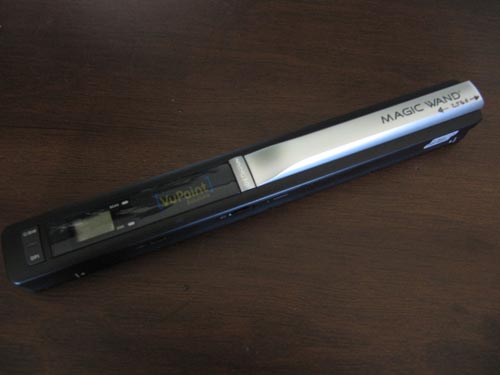 I have an e-volume reader I'm finding that I want to put everything that I have that is on paper into the device: books, magazine articles, users/owners manuals, cheat-sheets, apathetic, blah and blah. Just subsequently spending several hours scanning an out-of-print book that was falling apart using my standard Epson desktop scanner a few weeks ago, my enthusiasm faded. It just took also long per scanned page and I had to sit down in front of or very near my desk for several hours. Plus, it required booting upwardly my PC, logging on, waiting for kicking up, firing up the scanner software, yada, yada and yada. And yes, I DO happen to be the laziest person on the planet.
I have an e-volume reader I'm finding that I want to put everything that I have that is on paper into the device: books, magazine articles, users/owners manuals, cheat-sheets, apathetic, blah and blah. Just subsequently spending several hours scanning an out-of-print book that was falling apart using my standard Epson desktop scanner a few weeks ago, my enthusiasm faded. It just took also long per scanned page and I had to sit down in front of or very near my desk for several hours. Plus, it required booting upwardly my PC, logging on, waiting for kicking up, firing up the scanner software, yada, yada and yada. And yes, I DO happen to be the laziest person on the planet.
I also spent some fourth dimension looking through several DIY volume reader spider web sites (diybookscanner.org, for example) and while those devices could speed up the scanning time, building such a contraption is out of my technical skills and patience level.
I bumbled beyond Julie'southward review of the DocuPen and I thought that would be a nifty compromise to the long scan time of the desktop scanner versus the mechanical finesse required to build a DIY book scanner. But then I bumbled on to the price of the DocuPen (and yep I also happen to be the cheapest person on the planet). Then the VuPoint Magic Wand hand scanner($99) started popping up here and in that location. For $99 I hoped it would make the new Corking Compromise. Recall it did the job?
BASIC SPECS
Hither are the fru-fru specs from the VuPoint Solutions spider web site:
- Model PDS-ST410-VP
- Sensor A4 Color Contact prototype Sensor
- Resolution Standard Reso: 300x300dpi (default); Loftier Reso: 600x600dpi
- External Memory Support Micro SD bill of fare up to 32GB (Micro SD card not included)
- File Format JPEG
- LCD Scanning status brandish
- Auto Power Off Off/ 3 minute/ 5 minute
- Scanning Speed Approximate scanning speed (standard letter size)
-High res. with color – xiii sec.
-High res with mono – 6 sec.
-Standard res. with colour – 3 sec.
-Standard res with mono – 2 sec. - White Residuum Auto
- USB Port USB 2.0 loftier speed
- Ability Source 2xAA Batteries
- Battery Life Approx. 180 color or 200 monochromatic scans
- Dimension(LxHxW) 10" 10 1.2" 10 1.ane"
- LCD Brandish Size 0.787" x 0.59"
- Weight 7.5 oz (with batteries)
- Support System Driver free to download for Windows® XP SP2/ Windows® Vista/ Windows® 7™ and
Macintosh 10.4 or above ( directly plug-in, driverinstallation not required) - Accessories USB cable, 2x AA alkaline batteries, OCR software CD, Pouch, Cleaning material, user's manual
HARDWARE TOUR
Adjacent, permit's accept a tour of the device.
First it is almost a pes long and about an inch wide and deep. It has an indentation on each of its sides, providing a good grip when scanning.
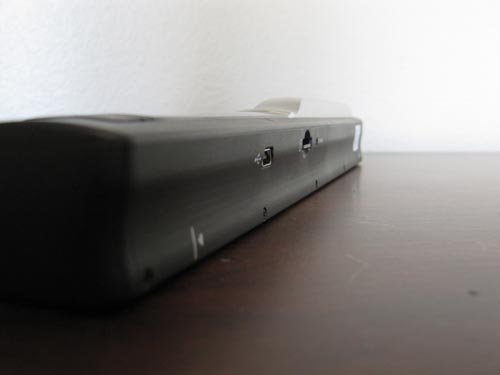
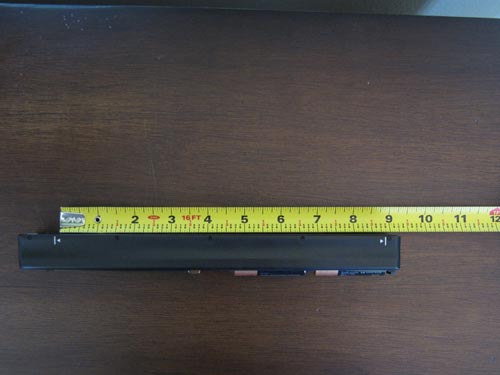
It is powered by two AA batteries and I've been running the matter for three or four days at present and it's nonetheless going strong. This is in role due, I believe, to the fashion that a scan is performed: you commencement hitting the scan start button, do the scan, then hit the first button again. Additionally, the scan light simply illuminates when the niggling rollers on the bottom of the device are in motion (more on that in a flake).
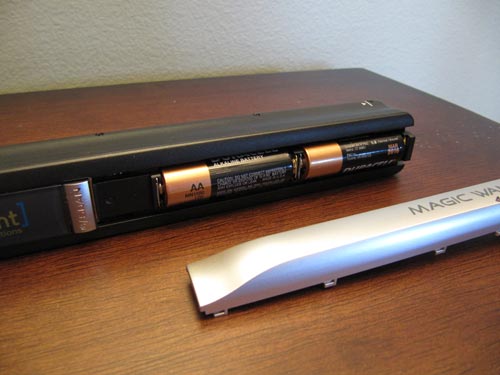
On the top of the device are two buttons that allow you to choose betwixt colour or black and white and 300 or 600 DPI. The on/off switch and start/browse switch (i switch doing two jobs) is as well on the meridian of the scanner. An LCD screen gives you indication of the number of scans you've performed, and the mode and resolution chosen. Two LEDs indicate when a scan is in progress and if an fault during the scan was detected.
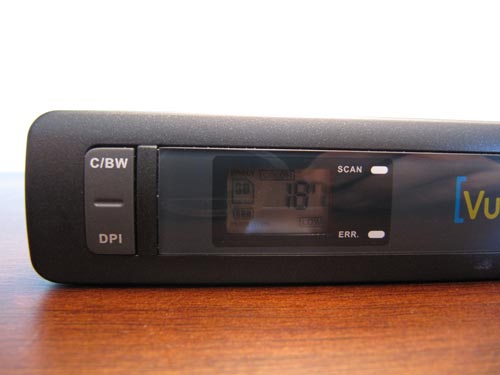
A USB port and micro ScanDisk port are forth the side. There is additionally a "Format" button that can exist pressed to reformat the memory deejay, though I never used information technology.
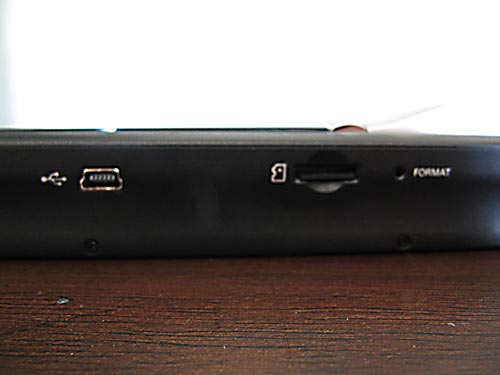
On the lesser of the unit you lot'll find the meat: the scanner and, equally important, a set of rollers. The scanning volition only take place while the rollers are in motion, a notion that is very important to think equally we go through this review.
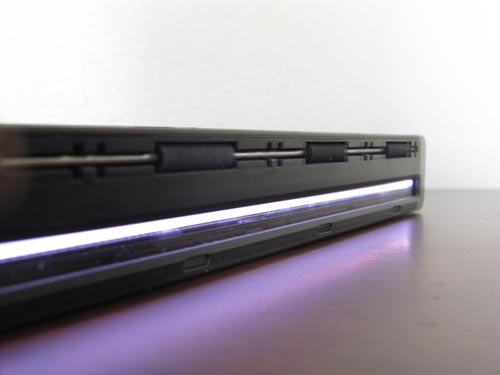
The wand also comes with OCR software.
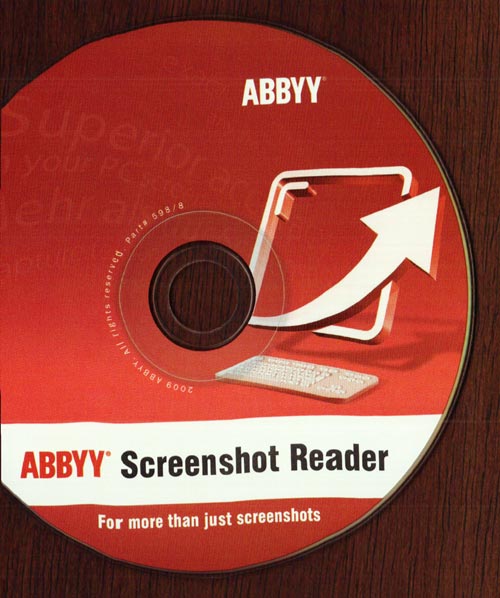
To perform a browse, turn the Magic Wand on with the on/off button for a few seconds until it turns on; and then press the on/off button again to start a scan, practice the browse thang, so turn the on/off push again to finish the browse. Wash, rinse echo.
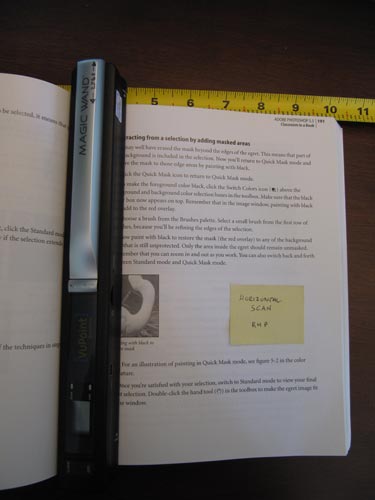
By default, the scanner turns on in color way and in the 300 DPI resolution. Pressing one of the two selection buttons allow you lot to easily change these modes.
Overall, the blueprint is pretty sweet. It'southward pocket-sized and narrow, has a great ergonomic indentation forth the sides to help you with the grip during a scan, and has a limited number of buttons to futz with. The LEDs and display offer unproblematic and intuitive feedback. If the ERR LED lights up, it indicates that the scan was not successful, although the browse is withal saved off every bit a file. That'south i of the annoying things I establish during scans: I couldn't tell what it was that would cause a scan error and I wish that it would non save the scan when an error did occur because those actress files with errors in them would require editing out later. Some of the scans that were reported as an mistake really looked ok, and then I would ofttimes times end upwardly with near-duplicate scans of the aforementioned page when editing. Below is a screen shot of the contents of the micro bulldoze when connected through the USB port on a PC subsequently several scans:
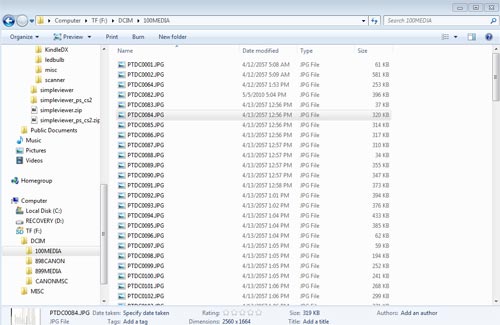
SCANNING EXAMPLES
Scanning actually took me a while to get used to because I kept trying to scan my book excerpts from meridian to bottom. Instead, due to the bending that occurs in the eye of the book binding (aka a "volume crack" hee hee), the scanner works best when running information technology from the middle of the bounden out to the end of the pages in a horizontal fashion. Once I dawned (duhed) onto running the browse sideways it usually became a breeze to scan a few pages here and in that location. I am a klutz then it was easy for me to foul up scans a number of times and the scanner would illuminate its Mistake light when that occurred. There were times when I thought that I had a smooth scan but the ERROR light would still turn on and I'd accept to repeat the scan. I tried to do some enquiry on why some scans simply don't work, only I haven't found annihilation to report yet. I'd just like to know what I'm doing incorrect on those occasions and be able to prevent it. Information technology would too exist REALLY nice if the scans that did result in an error were not saved.
My main purpose in using the Magic Wand was to browse a few out-of-print books that I have that are literally falling autonomously and to browse certain chapters out of technical manuals so I focused my scanning on that type of target. But I also performed scans on what I thought others might like to run across, including a magazine scan; recipes from a melt book; a regular 8×11 newspaper with a technical drawing; and a few other samples. All of the resulting images were fine. No complaints on the quality of the results. The post-obit examples bear witness some of these results.
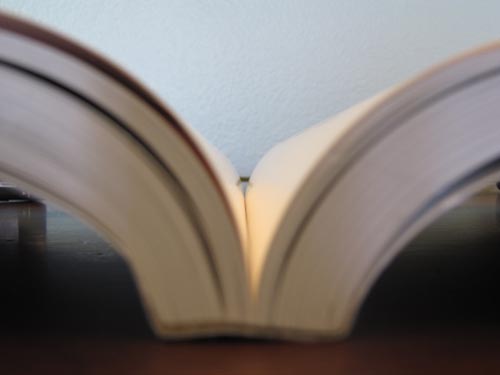
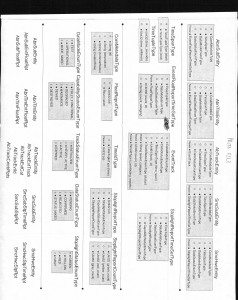
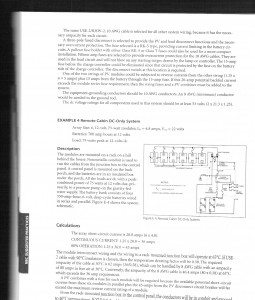
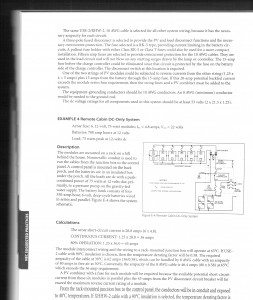
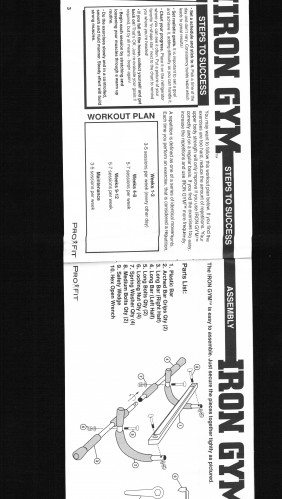
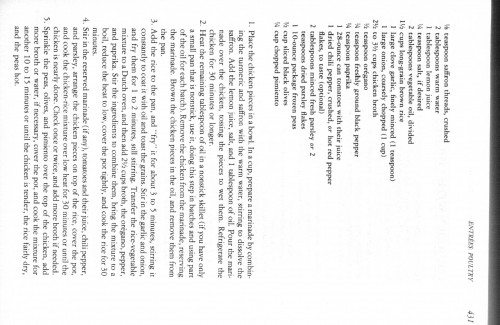
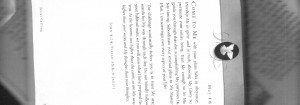
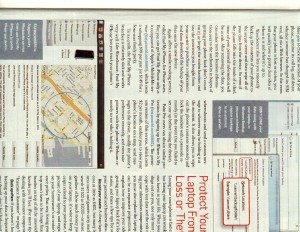
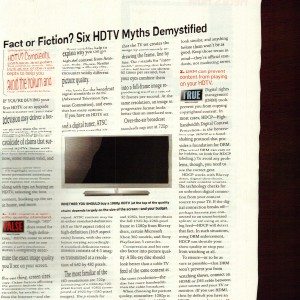
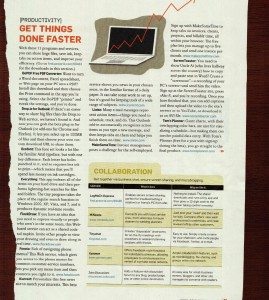
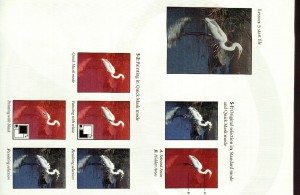
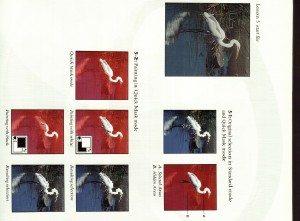
The biggest problem I had during scanning trying to get all of the information of a folio into the scan on sure books that have the page numbers at the very edge of the pages. The reason that it was difficult to go the folio numbers included on the scan is that the scan actually occurs only when the little rollers on the lesser of the wand are in motion. And, when folio numbers are at the very edge of the page, the roller wheels gyre off the page start, and the scanning turns off before it can read the page numbers. Annotation: this is NOT a error of the Magic Wand; information technology is just a thing of volume formats. Some books have page numbers in a nice place, others (in fact well-nigh of mine for some reason) take the page numbers way at the edge or nestled deep in the volume crack (heh). This is a fiddling hard to grok, so the following photos attempt to demonstrate the effect.
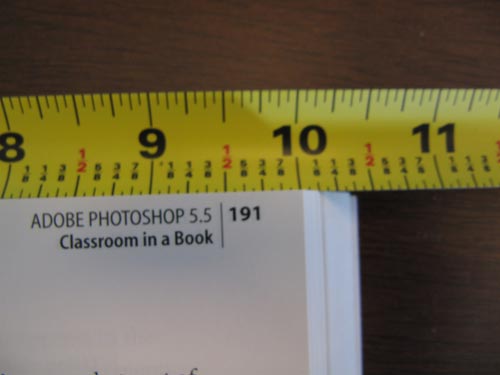
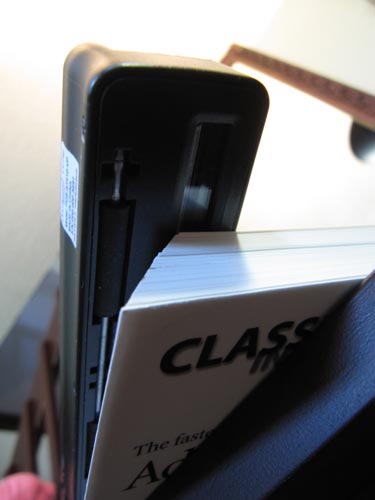
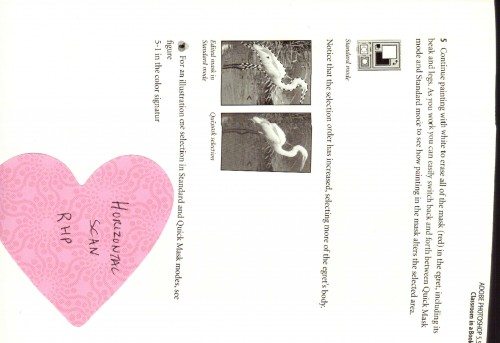
The reason that this is a problem for me is that when doing a big number of scans from a book (say, for example, that you lot wish to scan 100 or so pages),once the scanning is complete you then have to go back and "stich" the individual scanned pages into a complete east-book. You normally will want to have each image, rotate every bit needed, despeckle (as needed) and practise some overall make clean upwardly. Having the page numbers on the scanned images helps you in this procedure in putting together the concluding ebook merely also helps one time the ebook is complete and you need to skip around pages; having the folio number on the scan just makes that easier. I tried several configurations with the wand to attempt to get the unabridged contents of a page and the page numbers, just on some books this just was not possible. This is something to keep in heed if you plan on scanning many pages. My final decision is that when faced with these type of books (i.e. those that push button the page numbers to the far edge or binding volume crack [heh heh]) is to write the page numbers by hand in the volume away from the edges before first the scan.
OCR
The ABBYY ScreenShot software that comes with the Magic Wand has an OCR engine and has the following user interface:
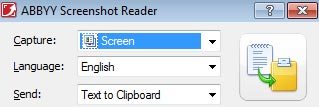
This version of ABBYY basically takes a screen shot of an prototype and performs an OCR. I used the following scanned image as the OCR candidate. Y'all can see in the second photo how the image is a little skewed, has some drain-through from the page in the volume beneath it, and has a few speckles. I ran ABBYY against this image as-is when viewed inside of the Windows image viewer program.
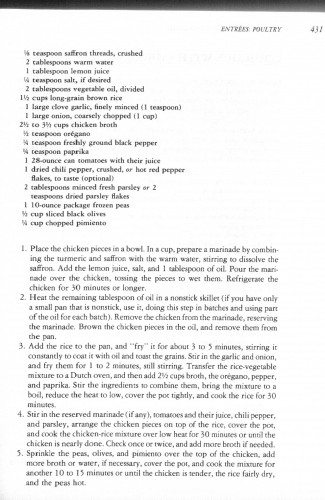
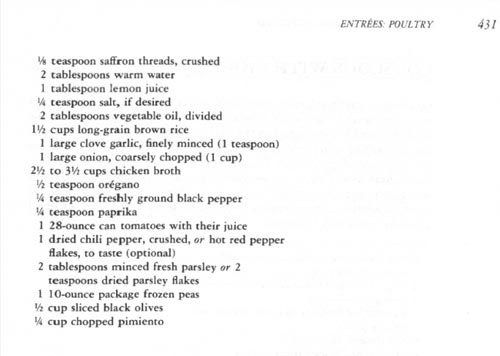
ABBYY literally uses the screen every bit a way to capture its text, so if you run it against a full size paradigm, equally shown below, you'll see the less-than-captivating results…
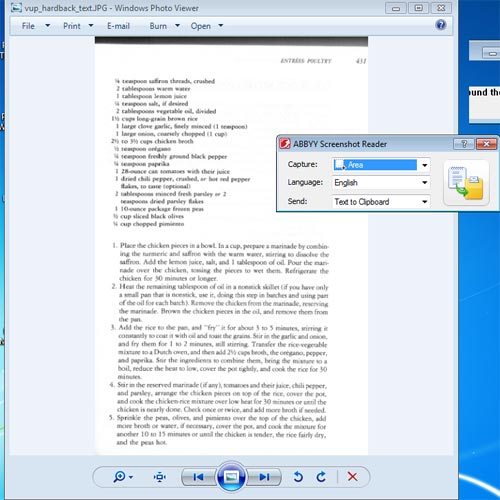
y vup_hardback_text.JPG - Windows Photo Viewer | cd S3 twMM evitrtr 4M • Irnpuin uflroo thread*, crudied 2 tahie<p>-*k »«k - ir. . one (ablnpoon lemon jiuie • trMpoon tall, information technology dewed ii lablnpoora vir.ttah* oil. divided \'i i t. ii-, «nn hrmn m I lat|K lUnr gaclic. baeli mimed (I icnpooo) I large matrimony, i narieli chopped 11 cup) 2*i io 34 (apt <(talked goop * icaapooo ire*hli footing black pepper •* trii|"in paprika I ¦-!"( ean tomaioci miih I heir |u«due east one dried thili prppct. iruihrd. »r h>H red pepper Hj«tv lo Uilc i pi i. ml 2 tahtnpiun mined frrih parelci at 2 KupmiiH dried pariley fleck* I ten-ounie package Iraien pea* 4 tup diied black oli»e» M <up (hopped p.mierao one Plate ihr .h* ken panel inaboaiL In a tup, prepfe a ananaaiie by to—tun in* the turmrtH and cypher*, wuh ihe warn ereaer. ¦ i ¦ ¦ • to daaanhr (he aaaTrun Add together the lemon mate. aafc. and I ufclcapooa at ual Pour the nan raadr ihr ihaihra towing ihr paexe* to wet mem K.11.iv.1.1. thr thntkrn (or 30 an mi of loaajrr. ii Ilea* the remaaaing iabte*pooai of oal ¦ ¦ wawmtk tatdart Irf yow bw .mh; a mmI pan tkaa n nmtort. aac "t. dean* dm tarp in hatthr* and uung pan tafraarodhwea^banch) Remove ft* chaifcra tr*»nihie minnaik.n- ¦ 1.. rhe wianna.tr Hnxm rhe chicken parte** ¦ ihr oil, and rteaam them from the pan Due south Add the rue to the pan. and "fry" information technology tor virtually 1 to ^ rnauttrv wirm* 11 mituantlv to ane oat xi »nh and i.uti the grain* Sail ir the garlii and imai. and fry them (or I i<> two minuie-i. Mil inrring Trantfcr the rue vegetable m unite 10a I>ut.h men. and then add 2Vi .uptbrixh. thc<«egan» peppvr. and paprika the ¦ngredimn 10 tumhanr (hem. bring the mmurr hi a boil, redutc the heaa ao loo. com oar pot nghih. and took the nee tor 30 minuan •». Sorai the rruroed marinade (afaan; Lasnuai^aod chor >a*east. chdi pepper, and pankn. arrange the (take* partn oa aunt** (he rxr. nmt the pi*, and ma rhe 1 h« «*"» He niiture c»*r in* krat thou« 5> mavarl or anal the chidM m eamrh; done Chart once or r**ce. and add more than baodt at ae-rded V Spnake- the- pern, olran, and paaaaraan over *W anp of *U chatkea. add ¦tore goop of »aacr d neiruari, com the pea. and took ake mature tor antmSer lOao |] mi mm-* or until the chKfcm xi arndcr, the ncc farl*.-dry. and the pcaa hot Results of ABBYY OCR of entire scanned epitome. This took about 40 seconds.
So I zoomed in on the page to increase the text size on the screen and re-ran the OCR with the following results . . .
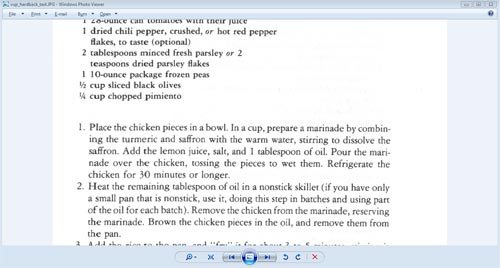
1 28-ounce can tomatoes with their juice 1 dried chili pepper, crushed, or hot carmine pepper flakes, to taste (optional) 2 tablespoons minced fresh parsley or 2 teaspoons stale parsley flakes I ten-ounce parcel frozen peas Half dozen cup sliced black olives xk cup chopped pimiento 1. Place the chicken pieces in a bowl. In a cup, prepare a marinade by combin- ing the turmeric and saffron with the warm water, stirring to dissolve the saffron. Add the lemon juice, salt, and ane tablespoon of oil. Cascade the mari- nade over the craven, tossing the pieces to wet them. Air-condition the chicken for 30 minutes or longer. 2. Oestrus the remaining tablespoon of oil in a nonstick skillet (if yous have only a pocket-size pan that is nonstick, apply it, doing this step in batches and using part of the oil for each batch). Remove the chicken from the marinade, reserving the marinade. Brown the chicken pieces in the oil, and remove them from the pan. Results of ABBYY scan after zooming in on the epitome.
And so after zooming in, the scan went much better. But imagine trying to do this for multiple (peradventure even hundreds) of pages. And you'd nevertheless accept to get back and practice a post-clean upward of the text where the OCR was incorrect. On the plus side, ABBYY has quite a number of supported languages which I found pretty impressive.
For batch processing, you lot might desire to look at a combination of Scan Tailor (to rotate, clean upwards the images, and convert them to TIFF format) and and then FreeOCR . These ii tools could help a fiddling with batch processing many pages. Following are a few screen shots of running just FreeOCR and its results.
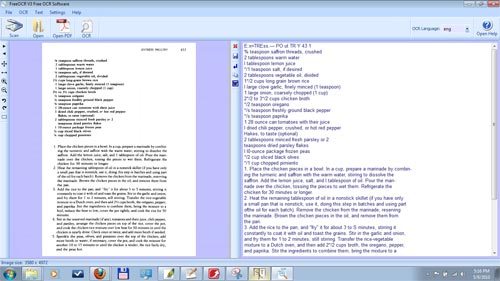
ENTREESY FOUL Endeavor I Vu teaspoon saffron threads, crushed 2 tablespoons warm water i tablespoon lemon juice IA teaspoon salt, if desired 2 tablespoons vegetable oil, divided 1% cups long-grain brown rice i big clove garlic, hnely minced (1 teaspoon) fifty large onion, coarsely chopped (1 cup) two*/2 to 3*/2 cups chicken broth % teaspoon oregano IA teaspoon freshly footing black pepper Vs teaspoon paprika fifty 28-ounce can tomatoes with their juice ane stale chili pepper, crushed, ar hot red pepper Hakes, to sense of taste (optional) two tablespoons minced fresh parsley or ii teaspoons dried parsley flakes 50 10-ounce packet frozen peas lb cup sliced blackness olives IA cup chopped pimiento 1. Identify the craven pieces in a bowl. In a cup, prepare a marinade by combin- ing the turmeric and saffron with the warm water, stirring to deliquesce the saffron. Add the lemon juice, salt, and 1 tablespoon of oil. Pour the mari- nade over the chicken, tossing the pieces to wet them. Refrigerate the chicken for xxx minutes or longer. ii. Oestrus the remaining tablespoon of oil in a nonstick skillet (if you take only a small pan that is nonstick, employ it, doing this stride in batches and using function of the oil for each batch). Remove the craven from the marinade, reserving the marinade. Brown the chicken pieces in the oil, and remove them from the pan. 3. Add the rice to the pan, and "fry" it for almost 3 to 5 minutes, stirring it constantly to coat it with oil and toast the grains. Stir in the garlic and onion, and fry them for 1 to two minutes, still stirring. Transfer the rice-vegetable mixture to a Dutch oven, and and so add 21/two cups broth, the oregano, pepper, and paprika. Stir the ingredients to combine them, bring the mixture to a boil, reduce the rut to low, embrace the pot tightly, and cook the rice for 30 minutes. four. Stir in the reserved marinade (if any), tomatoes and their juice, chili pepper, and parsley, adjust the chicken pieces on top of the rice, cover the pot, and melt the chicken-rice mixture over low estrus for xxx minutes or until the craven is nearly done. Check once or twice, and add more goop if needed. five. Sprinkle the peas, olives, and pimiento over the top of the chicken, add more broth or water, if necessary, cover the pot, and melt the mixture for some other x to 15 minutes or until the chicken is tender, the rice adequately dry, and the peas hot. Results of FreeORC conversion, great but notation all the extra line feeds
Finally, below is an example of clean up and conversion to TIFF through Scan Tailor followed past processing by FreeOCR.
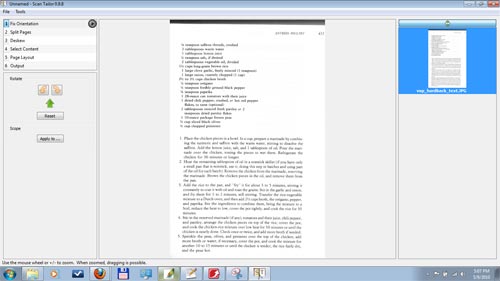
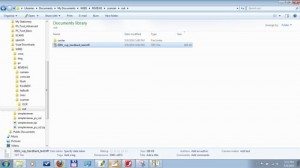
E:x¤TREss.— PO ut TR Y 43 1 % teaspoon saffron threads, crushed two tablespoons warm water 50 tablespoon lemon juice */i teaspoon salt, if desired ii tablespoons vegetable oil, divided one*/2 cups long·grain brown rice 50 large clove garlic, finely minced (1 teaspoon) ane large onion, coarsely chopped (ane cup) 2*/2 to iii*/2 cups chicken goop */2 teaspoon oregano */south teaspoon freshly basis black pepper */s teaspoon paprika 1 28·ounce can tomatoes with their juice l dried chili pepper, crushed, or hot red pepper Hakes, to taste (optional) 2 tablespoons minced fresh parsley or 2 teaspoons stale parsley flakes fifty l0-ounce package frozen peas */2 cup sliced black olives */1 cup chopped pimiento 1. Place the craven pieces in a basin. In a cup, prepare a marinade by combin- ing the turmeric and saffron with the warm h2o, stirring to dissolve the saffron. Add the lemon juice, salt, and l tablespoon of oil. Cascade the mari- nade over the chicken, tossing the pieces to wet them. Refrigerate the craven for 30 minutes or longer. 2. Heat the remaining tablespoon of oil in a nonstick skillet (if you have just a pocket-sized pan that is nonstick, use it, doing this step in batches and using part ofthe oil for each batch). Remove the craven from the marinade, reserving the marinade. Dark-brown the chicken pieces in the oil, and remove them from the pan. 3. Add together the rice to the pan, and "fry" information technology for about 3 to S minutes, stirring it constantly to glaze it with oil and toast the grains. Stir in the garlic and onion, and fry them for 1 to 2 minutes, still stirring. Transfer the rice-vegetable mixture to a Dutch oven, then add together 2*/2 cups broth, the oregano, pepper, and paprika. Stir the ingredients to combine them, bring the mixture to a eddy, reduce the rut to low, cover the pot tightly, and cook the rice for thirty minutes. iv. Stir in the reserved marinade (if any), tomatoes and their juice, chili pepper, and parsley, conform the chicken pieces on peak of the rice, cover the pot, and melt the craven-rice mixture over low heat for 30 minutes or until the chicken is virtually done. Check once or twice, and add more broth if needed. 5. Sprinkle the peas, olives, and pimiento over the top of the chicken, add together more broth or h2o, if necessary, cover the pot, and melt the mixture for some other x to fifteen minutes or until the craven is tender, the rice fairly dry out, and the peas hot. Results of FreeORC conversion after Scan Tailor clean upwards
Once you have your text, you can and then convert information technology to PDF format. Of form you tin also just convert the raw JPG files to PDF but so yous can't practice whatsoever searching on the results.
SUMMARY
This is a nice scanner, well thought-out and at a prissy price. (Y'all tin can even get information technology at Bed Bathroom & Beyond, past the fashion). For batch scanning it could work out but you want to watch out for books with text near the edges of the page.
| Model | PDS-ST410-VP |
| Features | Fast and convenient way to browse, annal & organize for your personal use |
| Sensor | A4 Color Contact paradigm Sensor |
| Resolution | Standard Reso: 300x300dpi (default); Loftier Reso: 600x600dpi |
| External Retention | Support Micro SD card upward to 32GB (Micro SD carte du jour not included) |
| File Format | JPEG |
| LCD | Scanning condition brandish |
| Machine Power Off | Off/ 3 minute/ 5 minute |
| Scanning Speed | Estimate scanning speed (standard letter size) -High res. with colour – 13 sec. -Loftier res with mono – 6 sec. -Standard res. with color – 3 sec. -Standard res with mono – 2 sec. |
| White Balance | Machine |
| USB Port | USB two.0 loftier speed |
| Power Source | 2xAA Batteries |
| Battery Life | Approx. 180 colour or 200 monochromatic scans |
| Dimension(LxHxW) | 10" x 1.two" 10 i.ane" |
| LCD Display Size | 0.787" x 0.59" |
| Weight | 7.five oz (with batteries) |
| Support System | Driver gratis to download for Windows® XP SP2/ Windows® Vista/ Windows® seven™ and Macintosh 10.4 or higher up ( direct plug-in, driverinstallation non required) |
| Accessories | USB cable, 2x AA element of group i batteries, OCR software CD, Pouch, Cleaning cloth, user's transmission |
Product Information
| Price: | $99 |
| Manufacturer: | VuPoint Solutions |
| Pros: |
|
| Cons: |
|
parkerbrerefrommen93.blogspot.com
Source: https://the-gadgeteer.com/2010/07/19/vupoint-magic-wand-scanner-review/
0 Response to "Customer Pick Customer Pick (713)read Reviews Vupoint Magic Wand 4 Photo and Document Scanner"
Post a Comment